
Keynote Speaker
Patricia C. Dykes, PhD, RN, FAAN, FACMI
Program Director Research
Center for Patient Safety, Research, and Practice
Brigham and Women’s Hospital
Associate Professor of Medicine
Harvard Medical School
Patricia Dykes is Associate Professor of Medicine at Harvard Medical School and Research Program Director for the Center for Patient Safety, Research and Practice at Brigham and Women’s Hospital in Boston. Her research aims to improve quality and safety through patient engagement and clinical decision support (CDS).
Dr. Dykes is leading patient safety informatics clinical trials to improve fall prevention and care transitions in primary care for patients with multiple chronic illness. She is also leading development of CDS and an electronic clinical quality measure to prevent and quantify delayed diagnosis of venous thromboembolism.
Dr. Dykes is author of 2 books, over 175 peer reviewed publications, and has presented her work nationally and internationally. She is immediate past President and Board Chair of the American Medical Informatics Association, an elected fellow of American Academy of Nursing, the American College of Medical Informatics, and the International Academy of Health Sciences Informatics.

Amber Beitelshees, PharmD, MPH
Amber Beitelshees is an Associate Professor of Medicine at the University of Maryland School of Medicine. Dr. Beitelshees’s research is focused on making pharmacogenomic discoveries in the areas of cardiovascular disease and diabetes and advancing the clinical implementation of genomic medicine. Her work integrates the disciplines of clinical pharmacology, genomics, metabolomics, molecular epidemiology, and clinical practice in a translational approach focused on improving patient outcomes. She is an elected Fellow of the American Heart Association (AHA) Genomic and Precision Medicine Council and the American College of Clinical Pharmacy (ACCP).

Sujal Bista, PhD
Sujal Bista is the Co-Director of University of Maryland Institute for Health Computing. His research interests include computer graphics, virtual and augmented reality, spatial audio, computer game development, medical and scientific visualization, machine learning, and human-motion understanding. Prior to joining the Institute for Health Computing, Bista founded a video game startup company. He earned his PhD and conducted postdoctoral research at the University of Maryland, College Park.

Irina Burd is a Professor and Chair of the Department of Obstetrics, Gynecology and Reproductive Sciences at the University of Maryland. Her areas of clinical expertise include high-risk pregnancy conditions and fetal brain development. Dr. Burd earned her undergraduate degree from Rutgers University. She completed the combined M./PhD program at the Rutgers University-Robert Wood Johnson Medical School. She completed her residency in obstetrics and gynecology at the Thomas Jefferson University Hospital and performed a fellowship in maternal-fetal medicine at the University of Pennsylvania. Dr. Burd was recruited to the University of Maryland from Johns Hopkins University, where Dr. Burd rose through the ranks from Assistant Professor to Full Professor.
Dr. Burd is a member of the Society for Maternal-Fetal Medicine, the Society for Gynecologic Investigation, and the Perinatal Research Society. She has published over 150 peer-reviewed research articles and is the recipient of numerous honors, including the Ikaria Research Award from the Perinatal Research Society, a research award from the American Board of Obstetrics and Gynecology/American Association of Obstetricians and Gynecologists Foundation, the Thomas R. Boggs Jr. Research Award from the Philadelphia Perinatal Society, Passano Foundation Clinician Scientist Award, SRI President’s Achievement Award, and ASRI Distinguished Service Award. Dr. Burd is a recipient of National Institutes of Health funding from 2009. Dr. Burd served as a Chair of NICHD Study Section “Obstetrics and Maternal Fetal Biology” from 2016 to 2021. She is past President of Perinatal Research Society and is President of American Society for Reproductive Immunology.
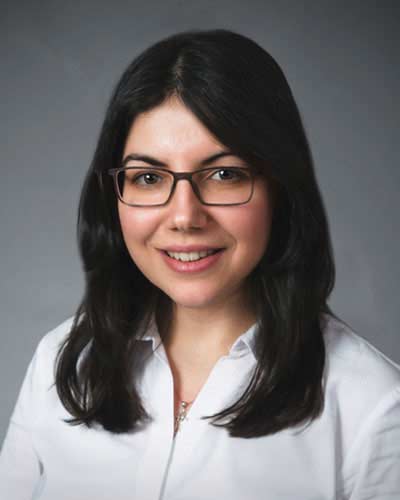
Luana Colloca is a Mpower Distinguished Professor at the University of Maryland Baltimore, holding an MD, a master's degree in Bioethics, and a PhD in Neuroscience. Her groundbreaking studies on pain modulation have advanced scientific understanding of psychoneurobiological mechanisms. Notably, she discovered the involvement of the vasopressin system in enhancing placebo effects. Dr. Colloca's current research focuses on orofacial chronic pain, genomics, expectancy mechanisms, hypoalgesia induced through observation, and applications of immersive virtual reality. Her integrated approach combining psychopharmacological, neurobiological, and behavioral aspects has earned her international recognition. She has published extensively in prestigious journals and received numerous awards, including the 2016 Wall Patrick International Award for basic pain research. Dr. Colloca's work has been featured in major media outlets worldwide.

Kevin Cullen is the Director of the University of Maryland Marlene and Stewart Greenebaum Comprehensive Cancer Center. He has held this position since 2004. Under his leadership, the UMGCCC achieved NCI Cancer Center Designation in 2007 and was elevated to Comprehensive Cancer Center status in 2015. Dr. Cullen is a medical oncologist and researcher focused on head and neck cancer. His research has focused on the role of Human Papilloma Virus in health disparities in head and neck malignancies. Dr. Cullen has served in a number of national leadership roles. He was appointed by President Obama to the National Cancer Advisory Board and served as Chairman of the Board of Directors of the American Cancer Society.

Warren D’Souza, PhD, MBA, FAAPM
Warren D’Souza serves as Vice President and Chief Innovation Officer for the University of Maryland Medical System (UMMS) where he leads iHarbor, the UMMS Center for Innovation, an anchor hub to improve health, business and clinical operations, drive innovation, and commercialize UMMS technologies. He also leads the Enterprise Data and Analytics division at UMMS and provides vision, leadership and day-to-day management for the data and analytics function to enhance clinical and business operations, accelerate transformation efforts. He also serves as the Co-Director of the University of Maryland Institute for Clinical and Translational Research Informatics Core, a joint resource for the University of Maryland, Baltimore, and the University of Maryland Medical System.
Prior to these roles, Dr. D’Souza served as the Chief, Division of Medical Physics in the Department of Radiation Oncology at the University of Maryland School of Medicine. He rose through the academic ranks to become Professor in 2014. Dr. D’Souza has published over 100 original articles, reviews and book chapters in peer-reviewed journals. He has served as principal investigator on federally funded and industry-sponsored research grants. He holds over a dozen patents and led the development of software technologies that were licensed to commercial entities.

Mark Gladwin was appointed as the Dean of the University of Maryland School of Medicine and Vice President for Medical Affairs at UMB in August 2022. He received his BS/MD degree from the University of Miami six-year Honors Program in Medical Education and completed his internship and chief residency in Internal Medicine at the Oregon Health Sciences University in Portland, Oregon, followed by a Critical Care Medicine fellowship at the NIH and a Pulmonary Fellowship at the University of Washington in Seattle. He returned for post-doctoral research fellowships at the NIH in cell and molecular biology, and later served as the Chief of the Pulmonary and Vascular Medicine Branch within the NHLBI. In 2008, Dr. Gladwin was recruited to the University of Pittsburgh to serve as Chief of the Division of Pulmonary, Allergy and Critical Care Medicine and the inaugural Director of the Vascular Medicine Institute, and in 2015 became Chair of the Department of Medicine at Pitt.
Dr. Gladwin maintains an active research group and is currently PI of two R01 awards, a P01 award, and a UH3/UG3 clinical trial. He has published more than 450 manuscripts since 1996, which have had a significant impact on the fields of vascular and nitric oxide biology. Dr. Gladwin has a long history of leadership of translational projects and programs, and has served as PI on major multicenter phase II clinical trials, including the DeNOVO trial of NO therapy for acute pain crisis in patients with sickle cell disease, the Walk-PHASST trial of sildenafil for pulmonary hypertension secondary to sickle cell disease, STERIO-SCD, and the current SCD-CARRE blood transfusion trial. Most recently, his laboratory has pioneered the use of recombinant neuroglobin and heme-based molecules as antidotes for CO poisoning, and this work resulted in the formation of a company, Globin Solutions.

Katherine Goodman is an Assistant Professor in the Department of Epidemiology and Public Health at the University of Maryland School of Medicine. A lawyer and infectious disease epidemiologist by training, her primary research focuses on addressing antimicrobial resistance and healthcare-acquired infections in hospital settings and on applying machine learning and other prediction model approaches to large secondary clinical data sources, including electronic health records (EHRs) and national claims databases. Her recent work in these areas has been published in JAMA, Annals of Internal Medicine, and Health Affairs Forefront, among other outlets. Dr. Goodman is the current PI/co-PI of an AHRQ-funded K01 and a Maryland MPower Award applying natural language processing and related informatics techniques to EHR data to develop targeted screening algorithms for identifying patients carrying highly antibiotic-resistant bacteria, to reduce their progression to clinical infection and transmission to other patients in the healthcare environment. Previously, Dr. Goodman practiced FDA law, and the intersection of law, FDA regulation, and public health remains an important research interest. With collaborators across the School of Medicine and the School of Law, Dr. Goodman has ongoing work focused on methodological and legal aspects of clinical algorithms, with a particular focus on regulation of algorithmic bias under healthcare anti-discrimination laws.

Anthony Harris is an infectious disease physician and epidemiologist whose research interests include emerging pathogens, antimicrobial-resistant bacteria, hospital epidemiology/infection control, epidemiologic methods in infectious diseases, and medical informatics. He has published over 300 papers. He has current or has had funding from the NIH, CDC, and AHRQ. Informatics work has mainly involved the use of local databases and national in-patient databases for retrospective observational epidemiology projects.

Peter Hu is Professor of Anesthesiology, Program in Trauma, Surgery and Epidemiology at UMB, and Adjunct Professor of Computer Science and Electrical Engineering at UMBC. He has more than 30 years experience in clinical research at the University of Maryland, Baltimore and Shock Trauma Center. He has been funded by NSF, NASA, NIH/NLM, DoD, VA. Last month he received $7.3M DARPA funding to collect pre-Hospital and trauma center high-fidelity vital signs for developing big data AI-based algorithms to predict trauma patient lifesaving interventions. Dr. Hu has more than 100 peer-reviewed publications and holds six patterns related to machine learning algorithms. His group developed and collected the largest trauma patient high-resolution physiological database in the U.S.
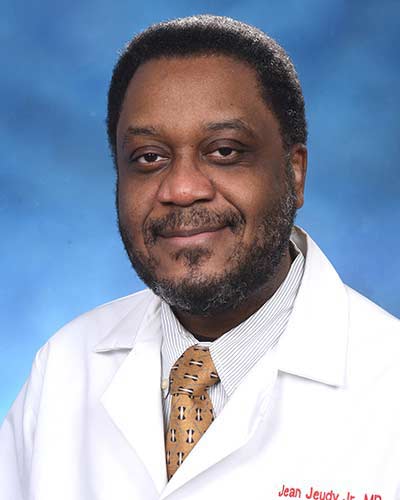
Jean Jeudy is a highly experienced radiologist, full professor, and widely recognized as a prominent lecturer in cardiac and pulmonary imaging. He has co-authored more than 130 peer-reviewed scientific publications. Dr. Jeudy serves as the Vice Chair for Imaging Informatics where he works to refine techniques for medical image storage, retrieval, and analysis, and aims to develop novel diagnostic and prognostic tools. His research interests include quantitative imaging. Currently, he leads the Cardiac MR COVID athlete cohort for the NCAA, investigating clinical and imaging biomarkers in young athletes. He is deeply invested in the potential of artificial intelligence in healthcare, actively participating in the collection and derivation of relevant datasets and evaluating algorithm performance in real-world clinical scenarios. Dr. Jeudy is committed to leveraging his knowledge to improve diagnostic accuracy in patients and empower physicians. He is enthusiastic about fostering a collaborative environment and supporting researchers in their pursuit of precision medicine discoveries.
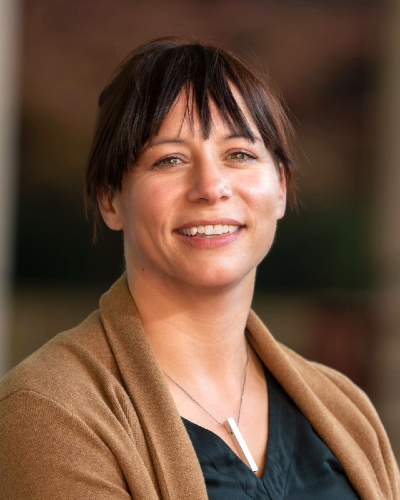
Martha Jurczak, MFA
Martha Jurczak joined the University of Maryland School of Medicine in late 2022 to help build the Institute for Health Computing, lead industry partnering efforts, and collaborate across the campus to enhance the clinical research infrastructure. Ms. Jurczak came to UMSOM from the University of Pittsburgh, where she developed research partnerships with pharma and biotech companies on behalf of the Department of Medicine, generating multimillion-dollar research alliances with three top-15 pharma companies and doubling industry funding over four years. Ms. Jurczak holds a Master of Fine Arts degree in theater management from the Yale School of Drama. Prior to working in academic medicine, she was Chief Operating Officer and consultant at Organizational Performance Group, a New Haven, CT-based consulting firm specializing in organizational development, where she worked with clients in the healthcare and nonprofit sectors. She served as Associate Managing Director of Yale Repertory Theatre and Assistant Director of Development at Court Theatre in Chicago. Ms. Jurczak has worked as a freelance writer, editor, and consultant for clients such as Harvard Business School and the Doris Duke Charitable Foundation.

Cheryl L. Knott, PhD
Cheryl Knott is a Professor in the Department of Behavioral and Community Health at the University of Maryland School of Public Health. She serves as Co-Leader of the Population Science Research Program and Associate Director of Community Outreach and Engagement at the University of Maryland Greenebaum Comprehensive Cancer Center. She is an inaugural MPower Professor of the University of Maryland Strategic Partnership: MPowering the State. She is founding Director of the Community Health Awareness, Messages, and Prevention (CHAMP) research lab and the Editor-in-Chief of the peer-reviewed journal, Translational Behavioral Medicine. Dr. Knott holds a secondary faculty appointment in the Department of Epidemiology and Public Health at the University of Maryland, School of Medicine. Her social epidemiology research focuses on multi-level drivers of cancer control behaviors in African Americans, and her interventional research focuses on implementation science.
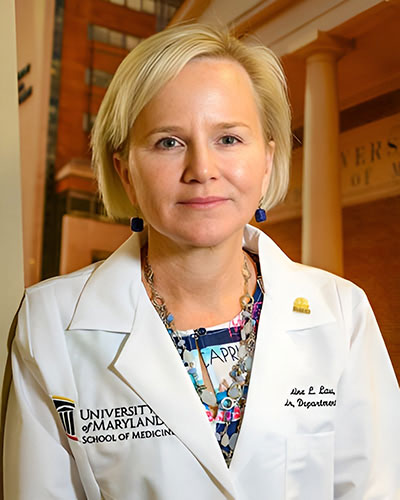
Christine Lau is a well-recognized leader in thoracic surgery, having served on numerous national committees and Boards. She has been a permanent member of SAT study section for the NHLBI and recognized as a Top Doc in thoracic surgery for decades. She has lectured nationally and internationally in thoracic surgery. She is proudest of being a mom to her two teenage sons.

Miriam Laufer is a Professor of Pediatrics and the Director of the Malaria Research Program Center for Vaccine Development and Global Health at the University of Maryland School of Medicine. She leads epidemiological and translational research focusing on global infectious diseases with the goal of translating scientific discovery into clinically relevant strategies to improve health. She leads a multi-disciplinary and international team of investigators, trainees, and students in the U.S. and Africa, who are dedicated to developing strategies and tools to support the global effort to tackle infectious diseases. In her laboratory at the University of Maryland, her team uses molecular, genomic, and immunological approaches to address the pressing challenges in controlling the burden of malaria. Dr. Laufer also serves as Associate Dean for Student Research, leading a wide range of efforts to enhance research education and research for medical students.

Bradley Maron is the Senior Associate Dean for Precision Medicine and Co-Director of the Institute for Health Computing at the University of Maryland School of Medicine. His laboratory studies redox biochemistry to identify functional essential protein cysteinyl thiols and utilizes network medicine to characterize the pathobiological mechanisms underpinning complex cardiovascular disease. In collaborative work, he led international projects focusing on the hemodynamic spectrum of clinical risk, which has contributed to a revised definition of pulmonary hypertension that is used in clinical practice. Dr. Maron has co-authored over 200 scientific manuscripts, is the co-inventor of several patents or pending patents, and is funded by the National Institutes of Health, and many other Foundations. He is a member of the American Society of Clinical Investigation, and a recipient of numerous awards for research, clinical skills, and teaching.
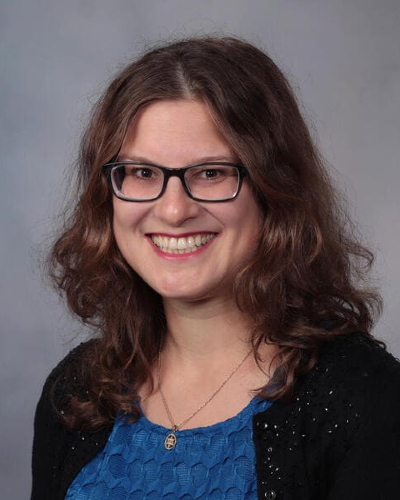
Rozalina G. McCoy, MD, MS
Dr. McCoy is an Associate Professor of Medicine and currently serves as the Vice Chair for Research in the Mayo Clinic Division of Community Internal Medicine, Geriatrics, and Palliative Care in Rochester, Minnesota, where she practices as a general internist and endocrinologist and is the medical director of the Mayo Clinic Ambulance Community Paramedic Service. This summer, Dr. McCoy will be joining the University of Maryland family, where she will serve as the Associate Division Chief for Clinical Research in the Division of Endocrinology, Diabetes, and Nutrition and as the Director of the Precision Medicine and Population Health Program within the University of Maryland Institute for Health Computing. Dr. McCoy is an NIH- and PCORI-funded clinician-scientist whose work leverages real-world data to improve the quality, equity, and accessibility of diabetes care. Additionally, she has internationally recognized expertise in the generation of real-world evidence for comparative effectiveness and safety research, including use of causal inference methods to emulate trials using real-world data and conduct of pragmatic, point-of-care, and decentralized clinical trials.

Sarah Murthi is a Professor of Surgery at the University of Maryland, Baltimore's School of Medicine, R Adams Cowley Shock Trauma Center. She is Director of the Center for Medical Innovation in eXtended Reality (MIXR) at the University of Maryland Baltimore. She has investigated immersive virtual reality XR in surgical training and as an adjunctive therapy to decrease acute pain. She has also performed research on using XR in bedside procedures including ultrasound, video-assisted intubation, and external ventricular drain placement.
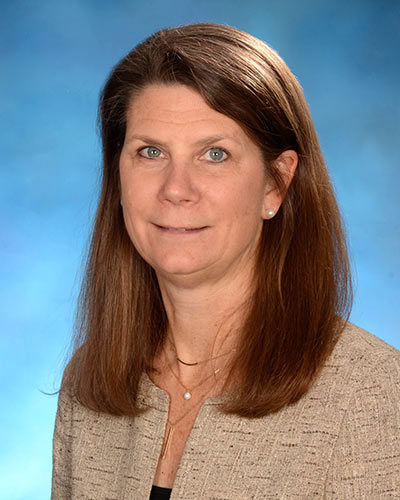
Kathleen M. Neuzil, MD, MPH, FIDSA
Kathleen Neuzil is the Myron M. Levine Professor in Vaccinology, Professor of Medicine and Pediatrics, and the Director of the Center for Vaccine Development and Global Health at the University of Maryland School of Medicine. She is an internationally recognized research scientist and advocate in the field of vaccinology. Throughout her career, Dr. Neuzil has conducted clinical and epidemiologic studies on vaccine-preventable diseases, yielding high-profile publications that inform policy decisions and public health actions. Dr. Neuzil’s work has spanned dozens of low-resource countries with multiple vaccines, including influenza, rotavirus, human papillomavirus, Japanese encephalitis, typhoid conjugate vaccines, and most recently, COVID-19 vaccines. Dr. Neuzil directs TyVAC, the Typhoid Vaccine Acceleration Consortium, with the goal to accelerate the introduction of typhoid conjugate vaccines into low-resource countries. She has more than 300 scientific publications on vaccines and infectious diseases. Dr. Neuzil's research capabilities are complemented by more than 20 years of involvement in domestic and international policy, including past membership on the U.S. Centers for Disease Control and Prevention’s Advisory Committee on Immunization Practices. She is a member of the World Health Organization Strategic Advisory Group of Experts on Immunization and of the National Academy of Medicine.

Jacques Ravel is a Professor in the Department of Microbiology and Immunology and the Acting Director at the Institute for Genome Sciences (IGS), University of Maryland School of Medicine in Baltimore, MD. As IGS Acting Director, he oversees the Maryland Genomics Translational & Diagnostics Laboratory at IGS, which aims to enhance patient care and clinical research by providing timely, relevant, and valuable genomic-based testing services to clinicians and scientists. His laboratory research uses clinical genomics and systems biology approaches to develop improved strategy to manage gynecological and obstetrics conditions, including innovative live biotherapeutics drug formulation to manipulate the vaginal microbiome. He has published over 300 peer-reviewed articles. His work earned him to be elected to Fellowship of the American Academy of Microbiology (AAM) in 2012.

Jason Rose is an Associate Professor of Medicine and currently serves as Associate Dean, Innovation & Physician Science Development at the University of Maryland School of Medicine, the Director of Faculty Entrepreneurship within Office of Research and Development at the University of Maryland, Baltimore, and is Acting Chair of the Department of Dermatology. Dr Rose’s research work focuses on inhalational toxicology, protein engineering, academic drug discovery and development, as well as mechanical ventilation in respiratory failure. He actively rounds in the Medical ICU. He has co-founded two companies. Globin Solutions, Inc., for which he currently serves as President & CEO, focuses on heme protein therapeutic targets in carbon monoxide poisoning and hemorrhage. He co-founded Omnibus Medical Devices, LLC, which is utilizing robotic and machine-learning approaches to facilitate better access to critical care through novel mechanical ventilation technology. Dr. Rose has also utilized large patient datasets for outcomes research in myocardial infarction and carbon monoxide poisoning.
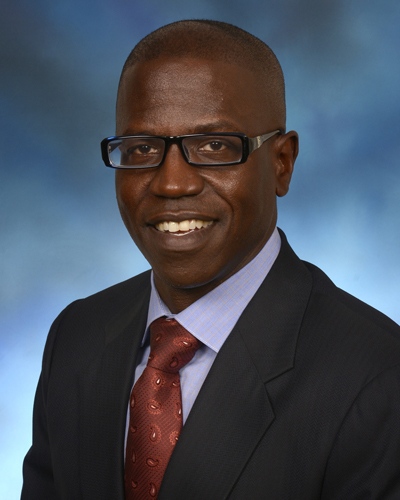
Rodney J. Taylor, MD, MSPH, FACS
Rodney J. Taylor is the Inaugural Bruce and Isobel Cleland Professor and Chairman of the Department of Otorhinolaryngology- Head & Neck Surgery at the University of Maryland School of Medicine. He joined the faculty in 2001 and is a surgeon-scientist whose clinical practice is dedicated to the comprehensive care of head and neck cancer (HNC) patients.
Dr. Taylor graduated from Harvard College with honors in 1991 and attended Harvard Medical School, receiving his medical degree in 1995. He then completed his residency at the University of Michigan and received a Master’s degree from their School of Public Health in Clinical Research.
Dr. Taylor’s research expertise includes head and neck cancer treatment disparities. He also has basic science and translational interests, which include studying ZSCAN4 as part of a system that confers and maintains cancer cell immortality in HNC.

Amitabh Varshney, MS, PhD
Amitabh Varshney is Dean of the College of Computer, Mathematical and Natural Sciences, and Professor of Computer Science at the University of Maryland, College Park. He received a B. Tech. in Computer Science from the Indian Institute of Technology, Delhi, and an MS and PhD in Computer Science from the University of North Carolina at Chapel Hill. Varshney's research focus is on exploring the applications of high-performance computing and visualization in engineering, science, and medicine. He has worked on a number of research areas including visual saliency, summarization of large visual datasets, and visual computing for big data. He is currently exploring applications of virtual and augmented reality in several applications, including healthcare and telemedicine. His work on efficient and robust computation of smooth molecular surfaces is useful in the rational drug design process through the protein folding and docking problems. He received the IEEE Visualization Technical Achievement Award in 2004. He is a Fellow of IEEE.

Paul Yi is Director of the University of Maryland Medical Intelligent Imaging (UM2ii) Center and Assistant Professor of Diagnostic Radiology and Nuclear Medicine. He also holds Adjunct positions in Engineering at the University of Maryland, College Park and Johns Hopkins. After completing a radiology residency and fellowship at Johns Hopkins in 2021, Dr. Yi joined the University of Maryland to build the UM2ii Center, an academic research hub for revolutionizing medical imaging AI by bringing together medical, engineering, and industrial experts. He has published over 100 articles in the peer-reviewed medical literature and his work has been profiled in numerous venues, including WIRED, Scientific American, U.S. News & World Report, and the Los Angeles Times. As a practicing physician-scientist, his current research interests include the development of AI and deep learning towards medical imaging applications, with special focus in evaluating the trustworthiness and fairness of deep learning models.
